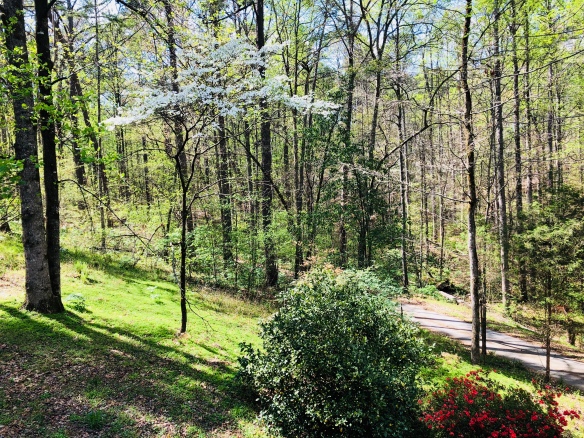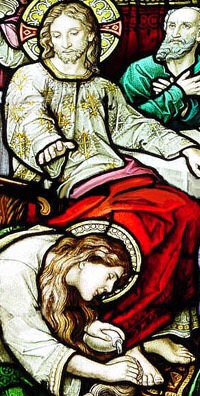 Eye has not seen,
Eye has not seen,
Ear has not heard,
Nor has it ever entered into the heart of man
the things which God has prepared for those who love him.
Some say nothing exists beyond the world seen with the eyes or experienced through the senses; that there is no life beyond what we daily experience. And, that life, in the end, is nothing more than chemical reactions in our biological matrix. There is no “heaven”, no “hell”, no after life, no resurrection, no God.
I do not fault those who believe this. I, however, do not find that explanation of things to be satisfying. There are hundreds or thousands of questions I can not answer. Questions that seem to confound the notion of a good and all loving God. Theodicy, as it is called, cannot be solved by human logic. I am not satisfied with that, but it is something I accept. This does not keep me from lying awake at night wondering why there is hunger in the world, or pain and suffering of innocents, or wars and famine and disease. I fail to understand how these things can be reconciled to an all loving, omnipotent God.
Yet, as strong an argument against the existence of God as that is, for me, there is a stronger more subtle and sublime reason I continue to believe. If there is a name for it, I don’t know what it is. It is the experience I have when I view a great work of art, or the wonder of a spectacular sunset, or grasp momentarily the indomitable spirit of some aged soul who has emerged from great suffering.
These are experiences that draw me out of myself to encounter the “other.” Beauty, aesthetics, wonder, awe. We all say certain things make us grateful or that we are thankful for this and that thing or experience. Whether it is purely *human* to say and feel such things and nothing more, I cannot say. But I feel, and I’d like to think, I intuit, that such feelings and aspirations are something more than biology. More than chemical reactions in my brain.
Religion as such is, and always has been, and in some sense, always will be, human and man made. There is no religion, per se, that is revealed as divine. Even in the Bible, in the Epistle of St James, it states, “Pure religion, and undefiled before God, is this: to visit the widows and orphans in their affliction and to keep oneself unspotted from the world.” Loving ones neighbor and living a good life. Elsewhere in the Bible, somewhere in the Old Testament, it says these words, “He has told thee, oh man, what is good and what the Lord requires of thee, to do justly, and to love mercy, and to walk humbly with your God.”
“Be ye kind to one another, tenderhearted, forgiving one another, even as God for Christ’s sake, has forgiven you.”
In America today, as in much of the world, Christianity has little to do with Christ. Any casual observer can see that Christians lead the world in hate and fear mongering. There is nothing of God in this religion. Nothing at all. Yet Christianity is not dead. There are little fountains of hope where the Way of Christ is remembered and practiced. It is not in the grand palaces of the Prosperity Gospel, nor in the old stalwart Churches of the old guard, but here and there, almost invisible. The ugly, the lame, the blind, the sick, the poor, the outcasts, the disenfranchised, the lonely…the dregs of society; these are places where the Spirit is moving. Not in the whirlwind, not in the fire, not in the earthquake, but in the stillness with a small quiet voice, God is speaking.
In times of great spiritual famine, such as today, when the Word of God is so rare that it has been forgotten, God calls his people to come out of Babylon. A small drop of water at first, then a trickle, a stream, and then a mighty river. When every effort has been made to induce God from heaven to no avail, he speaks to those who will listen. He who has an ear, let him hear. It is not by might nor by power, but by my Spirit, says the Lord.
Christianity has sold it’s soul for a mess of pottage. It has exchanged the truth for a lie by courting political power and creating a god of its own imagination. It will die in the dust bin of history. Even now it is gasping for breath and grabbing at the air.
The end is near.
Christendom is dying and it is not a noble death, but an ignominious one. For more than 2000 years the Church has existed with saints and sinners in her pail. I wonder if she will survive this famine. We cannot hearken back to the past. Science has become the tree of the knowledge of good and evil. We know too much now. To go back would be hypocrisy and an unconscionable evil. Having eaten the fruit of that tree, we are bound to live with the results. The old must die and fade into the misty memories of an early childhood.
We have indeed begun to grow up as a race. We would be fools if we despised Science and all that it has taught us and the great promise that it holds for our future. We must embrace it and change ourselves. A Christianity that cannot or will not change and adapt, is already a dead, lifeless, corpse.
As for me, I will continue to be awed at the mystery of reality, at its beauty and tragedy. I will continue to believe in the ultimate victory of good over evil, of light over darkness, of life over death. I will continue to follow Jesus as best I can, to love my neighbor as myself and to do good in the world. I think ALL of us can agree on those last two parts, loving ones neighbor and doing good. It matters not what one believes if one does those things. This is all that is required for a better world. A better humanity.

 The greatest virtue of all is love. By it the entire cosmos will be changed. Yet there is another virtue that is prerequisite to love, and in that sense, more essential. That virtue is honesty.
The greatest virtue of all is love. By it the entire cosmos will be changed. Yet there is another virtue that is prerequisite to love, and in that sense, more essential. That virtue is honesty.
 The poor you will always have with you, but you will not always have me. – Matthew 26:11
The poor you will always have with you, but you will not always have me. – Matthew 26:11 For most of my adult life, including also my teen years, I have striven to be a pious Christian. Being a questioner by nature, I have always wanted to know exactly what piety is and how to obtain it.
For most of my adult life, including also my teen years, I have striven to be a pious Christian. Being a questioner by nature, I have always wanted to know exactly what piety is and how to obtain it. One thing that science has taught us about ourselves is that we are, apparently, in the grand scheme of things, insignificant creatures, on a small planet, in a remote section, of an obscure galaxy. The incarnation notwithstanding, humanity is not the center of the cosmos and I do not see that being imago dei gives us any unique claim to being so.
One thing that science has taught us about ourselves is that we are, apparently, in the grand scheme of things, insignificant creatures, on a small planet, in a remote section, of an obscure galaxy. The incarnation notwithstanding, humanity is not the center of the cosmos and I do not see that being imago dei gives us any unique claim to being so. Christians in the United States of America, are you concerned about our borders? Are you concerned about the de-christianization of America?
Christians in the United States of America, are you concerned about our borders? Are you concerned about the de-christianization of America? I have written about this a number of times, but it is more pertinent than ever that it be reiterated.
I have written about this a number of times, but it is more pertinent than ever that it be reiterated.